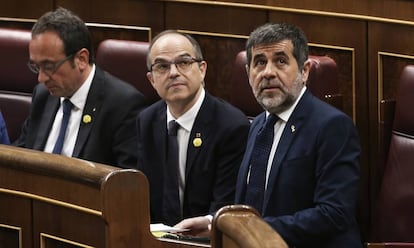Congress suspends deputies on trial for role in Catalan independence drive
The four men, who are currently being held in custody while facing charges for their actions in 2017, will from today no longer be parliamentarians, something that could benefit acting Prime Minister Pedro Sánchez

The Congressional Speaker’s Committee has agreed to “automatically” suspend the deputies who are currently on trial in the Supreme Court for their role in the 2017 independence drive in the northeastern Spanish region of Catalonia. The committee, which is the governing body of Spain’s lower house of parliament, took the decision after receiving advice from its legal advisors, and will thus strip Oriol Junqueras, Jordi Turull, Josep Rull and Jordi Sànchez of their status as lawmakers.
The four men are being held in custody while they are tried for charges including rebellion, sedition and misuse of funds
The four men are being held in custody while they are tried for charges including rebellion, sedition and misuse of funds. They are facing possible jail sentences of between eight and 25 years should they be found guilty. They were released from custody on Monday and Tuesday in order to be sworn in as deputies.
The new speaker of Congress, Meritxell Batet, announced the decision today at a press conference. The members of the committee from Batet’s Socialist Party (PSOE), the conservative Popular Party (PP) and center-right Citizens (Ciudadanos) all voted in favor of the measure. Left-wing anti-austerity group Unidas Podemos, meanwhile, which holds two of the nine seats on the committee, disagreed with the measure.
According to the legal advice given to the Speaker’s Committee, the decision had to be taken in accordance with Spain’s Criminal Procedure Law, and not under the regulations governing Congress itself.
Left-wing Unidas Podemos, which holds two of the nine seats on the committee, disagrees with the measure
The lawyers have also left it up to the Speaker’s Committee to decide on “the reach of the suspension while the situation of imprisonment continues.” This also includes the “calculation of the absolute majority.” This latter advice means that the total number of deputies in Congress could fall from 350 to 346, on the basis that the suspended deputies are not replaced by other members of their parties who ran on the electoral lists at the recent April 28 general election.
A change in the number of deputies could be of key importance to acting Prime Minister Pedro Sánchez of the PSOE, who took the most seats at the general election but fell short of a majority. Sánchez is likely to form a government with the support of Unidas Podemos and other smaller parties. It is highly likely that the acting PM would want to avoid having to seek the votes of the pro-independence groups in Congress, given that the opposition has been hugely critical of his attempts at dialogue with parties that, they claim, want to “break up the unity of Spain,” and due to the demands of such parties in exchange for support, which include a referendum on independence for Catalonia.
A change in the arithmetic in Congress would make it much easier for Sánchez to win a second investiture vote, at which just a simple majority – more yes votes than no – is needed for success.
A change in the arithmetic in Congress would make it much easier for Sánchez to win a second investiture vote, at which just a simple majority is needed for success
On Friday, the speaker in Congress announced that her committee had requested a new report from the legal advisors in order to determine how majorities will now be calculated in the lower house of parliament.
The debate over how the decision should be taken to suspend or not the five parliamentarians currently on trial (a fifth, Raül Romeva, has been voted into the upper house, the Senate), caused an unprecedented back-and-forth of messages this week between Congress, the Supreme Court and the public prosecutor, with no one apparently willing to take the decision.
On Wednesday, the public prosecutor called on the Supreme Court to order parliament to “immediately” suspend the deputies in question, on the basis of the Criminal Procedure Law, which states that public officials facing trial for the offense of rebellion and who are being held in custody should be suspended.
That same day, the new speaker in Congress, Meritxell Batet, passed the responsibility for the suspension back to the Supreme Court, arguing that the “jurisdictional function corresponds to the judicial power.” But the top court’s reply once again called on Congress to take action, which, finally on Friday, it did.
English version by Simon Hunter.
Tu suscripción se está usando en otro dispositivo
¿Quieres añadir otro usuario a tu suscripción?
Si continúas leyendo en este dispositivo, no se podrá leer en el otro.
FlechaTu suscripción se está usando en otro dispositivo y solo puedes acceder a EL PAÍS desde un dispositivo a la vez.
Si quieres compartir tu cuenta, cambia tu suscripción a la modalidad Premium, así podrás añadir otro usuario. Cada uno accederá con su propia cuenta de email, lo que os permitirá personalizar vuestra experiencia en EL PAÍS.
¿Tienes una suscripción de empresa? Accede aquí para contratar más cuentas.
En el caso de no saber quién está usando tu cuenta, te recomendamos cambiar tu contraseña aquí.
Si decides continuar compartiendo tu cuenta, este mensaje se mostrará en tu dispositivo y en el de la otra persona que está usando tu cuenta de forma indefinida, afectando a tu experiencia de lectura. Puedes consultar aquí los términos y condiciones de la suscripción digital.








































